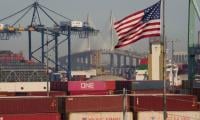Amreli Steels to increase rebar output to 500,000 tons from next year
KARACHI: Amreli Steels, the country’s leading manufacturer of steel bars, is all set to more than double its production capacity from May next as the steel maker is building a new plant near the suburbs of the metropolis, its official said.
The company is expected to kick-start its new re-rolling plant in Dhabeji with an estimated annual capacity of 300,000 tons. The operational capacity of its existing re-rolling plant, located in Sindh Industrial Trading Estates, Karachi, is 180,000 tons/year.
Director Hadi Akberali at Amreli Steels said the civil and engineering works on the plant’s site have already begun.
“We expect the civil works to be completed within the next three to four months,” Akberali said in an interview. “We have plans to start the commissioning of the project by March 2017, if the sequencing of all activities goes on smoothly.”
The new re-rolling plant is a part of the steel maker’s expansion strategy. And, it is financing the project, which has an estimated cost of Rs3.4 billion, through equity raised through the initial public offering in October last.
The steel market managed to raise Rs3.79 billion by selling 138.8 million shares.
“This plant will introduce best pioneering technology, including a controlled direct hot charging facility that will set new cost and efficiency benchmarks in the industry, “Akberali said. “It will save energy and reduce production cost.”
He said the installation of the plant of Primetals Technologies Italy will give the company the benefits of competitive conversion costs and economies of scale and production of high quality products, which will be in line with international standards.
An estimate puts the local consumption of steel bars between three and 3.5 million tons. The State Bank of Pakistan said the local steel production stands at six million metric tons of steel per year.
The executive said Pakistan is a steel deficit country and likely to see increased demand mainly due to the government’s focus on infrastructure projects, especially under the China-Pakistan economic corridor.
“The higher allocations for public sector development projects in FY17 (2016/17) federal budget and boom in housing schemes are set to increase steel consumption,” he added.
Most of the steel bars manufacturers in the country are operating at 70 percent of their capacity. Akberali hopes that manufacturers would enhance capacity to 100 percent in anticipation of increased demand for the steel in future.
He said the market for the steel bars has grown over the past few years with rising steel requirement from the infrastructure, retail and corporate sectors. “The imposition of 15 percent regulatory duty on steel rebars is a positive step towards checking the import of steel bars from China and to protect the local industry,” Akberali said. “The steel industry is in a dire need of strong regulations.”
The company’s director said a regulatory body monitors the size, grade and specification of steel being used by the consumers in every country to ensure that the manufacturers are producing bars in line with the global standards. “We have also in talks with the government to formulate a national steel policy for the next 10 years,” he said. “If the government gives us incentives we will be able to export steel products within the few years.”
-
 Tropical Cyclone Horacio Becomes World’s First Category 5 Superstorm Of 2026: Latest Forecast & Risks Explained
Tropical Cyclone Horacio Becomes World’s First Category 5 Superstorm Of 2026: Latest Forecast & Risks Explained -
 Hilary Duff Recalls Brutal Thing She Did To Husband Matthew Koma After Losing Their Home In Los Angeles Wildfire
Hilary Duff Recalls Brutal Thing She Did To Husband Matthew Koma After Losing Their Home In Los Angeles Wildfire -
 Princess Beatrice, Edo Mapelli Mozzi Fall Into Marital Woes: ‘He Doesn’t Want Her Seen With Andrew’
Princess Beatrice, Edo Mapelli Mozzi Fall Into Marital Woes: ‘He Doesn’t Want Her Seen With Andrew’ -
 Meta’s Internal Memo Reveals How Executives Ignore Safety Warnings To Push Messenger Encryption Rollout Despite Risks To Teen Safety
Meta’s Internal Memo Reveals How Executives Ignore Safety Warnings To Push Messenger Encryption Rollout Despite Risks To Teen Safety -
 Robert Carradine's Shocking Suicide Answer 'lies' In Brother David Old Tragic Incident
Robert Carradine's Shocking Suicide Answer 'lies' In Brother David Old Tragic Incident -
 'CIA' Star Tom Ellis Drops Bombshell Reason Why He Stayed Away From 'FBI': I Know What They Do'
'CIA' Star Tom Ellis Drops Bombshell Reason Why He Stayed Away From 'FBI': I Know What They Do' -
 Biographer Calls Andrew National Security Risk: ‘This Huge Can Of Worms Is Getting Closer To King’
Biographer Calls Andrew National Security Risk: ‘This Huge Can Of Worms Is Getting Closer To King’ -
 DeepSeek Under Fire: Anthropic Accuses Chinese AI Firm Of Misusing Claude For Unauthorized Model Training
DeepSeek Under Fire: Anthropic Accuses Chinese AI Firm Of Misusing Claude For Unauthorized Model Training -
 Would You Drive In A Driverless Taxi? AI-powered Robotaxis Roll Out In London Amid Growing Debates Over Road Safety, Passenger Convenience
Would You Drive In A Driverless Taxi? AI-powered Robotaxis Roll Out In London Amid Growing Debates Over Road Safety, Passenger Convenience -
 Trump’s Tariff Plan: 10 Percent Rate Takes Effect Despite 15 Percent Announcement Following Supreme Court Ruling
Trump’s Tariff Plan: 10 Percent Rate Takes Effect Despite 15 Percent Announcement Following Supreme Court Ruling -
 Eric Church Reveals How Vince Gill Made His Brother Barndon's Death 'a New Normal'
Eric Church Reveals How Vince Gill Made His Brother Barndon's Death 'a New Normal' -
 Harry, Meghan Offer Help To Beatrice, Eugenie As They Navigate Big Decision
Harry, Meghan Offer Help To Beatrice, Eugenie As They Navigate Big Decision -
 Robert Carradine's Heartbroken Brother Keith Breaks Silence On Actor's Tragic Death
Robert Carradine's Heartbroken Brother Keith Breaks Silence On Actor's Tragic Death -
 How Deepfake Scams Are Reaching Record Levels By Targeting Social Media Users: Everything You Need To Know
How Deepfake Scams Are Reaching Record Levels By Targeting Social Media Users: Everything You Need To Know -
 Taylor Swift Embraces Herself As Her Career Hits Major Milestone: 'I Am Blown Away'
Taylor Swift Embraces Herself As Her Career Hits Major Milestone: 'I Am Blown Away' -
 Andrew’s Arrest Takes Over US Elites: ‘They’re Calling Lawyers In Fear The Police Will Pounce’
Andrew’s Arrest Takes Over US Elites: ‘They’re Calling Lawyers In Fear The Police Will Pounce’



